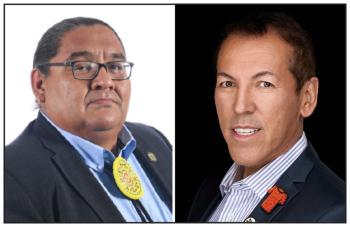Image Caption
Summary
Local Journalism Initiative Reporter
Windspeaker.com
Stephen Buffalo is fed up.
A member of the Samson Cree Nation in Alberta, Buffalo is president and CEO of the Indian Resource Council (IRC), founded in 1987 by chiefs representing oil and gas producing First Nations.
While the IRC has staged numerous events in western Canada over the years, its first one in eastern Canada was the True ReconciliACTION Conference held Jan. 11 in Toronto.
Buffalo was one of the panelists at the Toronto event for a discussion titled “What’s Next: The Path Towards True ReconciliACTION.”
He spoke about his dissatisfaction with the Canadian government, which in recent years has imposed strict controls on fossil fuel development while establishing new levies and taxes, which hinder Indigenous efforts in the industry, he said.
“Unfortunately, this government is not quite listening,” said Buffalo. “And we’re working on something right now to really challenge this carbon tax, because as we’ve progressed to now this federal government has slowly whittled away at some of our Indigenous rights. We’re letting them have it.”
Buffalo believes action must be taken.
“Even though we have our culture, our ceremonies and traditions, we still need that step forward,” he said.
Buffalo said it’s time that Indigenous communities do something.
“I hate to be non-partisan anymore, because this government is attacking not only industry but it’s attacking our communities in a soft way,” he said.
“I call it soft communism being under the Indian Act. So, this energy industry is so critical for our people, despite what people might think and some of the narratives you’re hearing from environmental groups.”
Buffalo said he believes the key to Canada’s success is resource revenue sharing for First Nations. He has a difficult time hearing about federal equalization payments.
“Our people struggle,” he said. “It’s not that we want to all be driving Hummers and limos. It’s just that we want a better quality of life for the majority of our communities in Canada. How does it get better? We have to change this Act. This Indian Act is doing nothing for us but keeping us down.”
Dale Swampy, also a member of Samson Cree Nation, founded the National Coalition of Chiefs in 2016. The coalition’s mandate is to defeat on-reserve poverty by working with the natural resource industry.
Swampy was one of the speakers on the “What’s Next” panel.
“We think the carbon tax exemption is something we should capitalize on,” he said. “We should get a lawsuit going so we can actually offer some carbon tax relief with petroleum companies.”
Several other panels were also held at the conference. One was called “True ReconciliACTION: Pushing the Envelope for First Nations Participation in Major Capital Projects.” And another one was titled “Investment Opportunities in the Upstream Oil/Gas Sector.”
Chief Raymond Powder from Fort McKay First Nation in Alberta and Chief Delbert Wapass from Thunderchild First Nation in Saskatchewan were among those who spoke on the “Pushing the Envelope” panel.
Powder talked about his First Nation’s economic arm, the Fort McKay Group of Companies, founded in 1986.
Some of the First Nation’s early contracts were minor ones, including seasonal work of burning brush and providing janitorial services.
Fort McKay officially became a First Nation in 2007. It is now a leading example for other First Nations because it has thrived by creating joint ventures.
“As of today in 2024, we have 14 joint ventures that is not only within Fort McKay, but is also within Alberta and right across Canada,” Powder said, adding his First Nation has a zero per cent unemployment rate.
Wapass spoke about a multi-million-dollar facility in his First Nation, which includes an arena, fitness centre, field house and daycare.
He said his First Nation was able to build the state-of-the-art facility in part because he formed a relationship with Husky following a massive oil spill in its territory in 2016. Wapass opted not to pursue legal options following the spill.
“I used industry to open doors,” he said. “And I didn’t care. All I cared about was how am I going to bring home something for my people.”
Brian Schmidt, the president and CEO of Tamarack Valley Energy, an oil and gas company whose headquarters are based in Calgary, was one of the panelists for the Investment Opportunities in the Upstream Oil/Gas Sector panel.
“More companies are measuring and tracking and trying to recruit and train Indigenous workers, especially in the traditional areas that they operate,” he said.
Related story: https://windspeaker.com/news/windspeaker-news/first-nations-metis-settl…
The IRC plans to hold another conference in Ottawa this June.
Support Independent Journalism. SUPPORT US!

